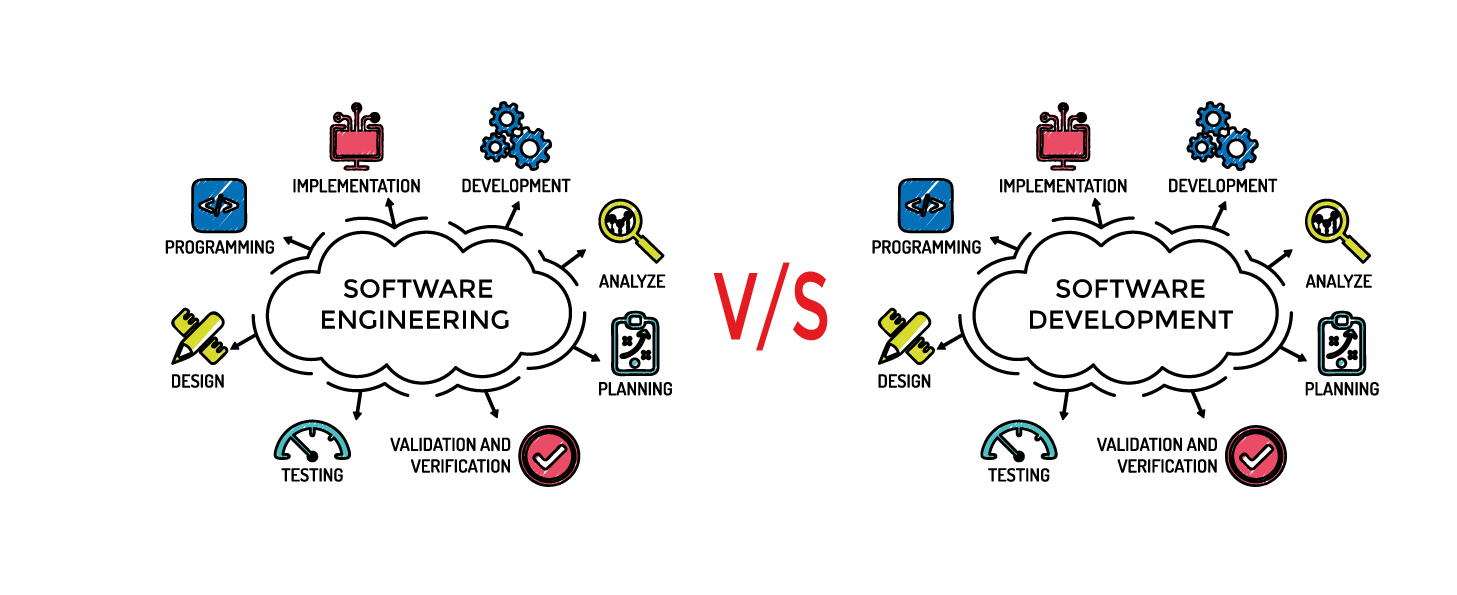Software Engineer vs. Software Developer: Understanding the Differences and Overlaps
The terms “software engineer” and “software developer” are often used interchangeably in the tech industry. However, while they share many similarities, they also have distinct roles, responsibilities, and skill sets. This blog aims to elucidate the differences and overlaps between these two professions, providing a comprehensive understanding of each role.
Software Engineer and Developer: Education and Skills
Software Engineer: A software engineer applies engineering principles to the design, development, maintenance, testing, and evaluation of software and systems that make computers or anything containing software, such as chips, work. They often work on large-scale projects and are involved in the full software development lifecycle. Their approach is systematic, and they often focus on the infrastructure and the integration of systems.
Education: Typically, software engineers hold a degree in computer science, software engineering, or a related field. Their education emphasises engineering principles, algorithms, data structures, and system design. The skills to excel the field are:
- System Design: Proficiency in designing robust and scalable systems.
- Programming Languages: Mastery of languages such as Java, C++, Python, and others.
- Problem-Solving: A good analytical skills to solve the envisioned problems.
- Mathematics: A solid understanding of mathematics, especially in algorithms and data structures.
- Engineering Principles: Knowledge of software development methodologies like Agile and Waterfall.
- Project Management: Skills in managing large projects and working in teams.
Software Developer: A software developer, on the other hand, focuses more on the creative aspects of software creation. They write, debug, and execute the source code of software applications. Developers often work on smaller, more user-facing parts of the software and may not necessarily involve themselves in the overall system architecture.
Education: While many developers have degrees in computer science or related fields, some are self-taught or have completed coding bootcamps. The emphasis is often on practical coding skills. The skills to excel the field are:
- Programming Languages: Proficiency in languages such as JavaScript, Python, Ruby, etc.
- Creativity: Ability to create user-friendly applications.
- Problem-Solving: Practical problem-solving skills for debugging and coding.
- Software Tools: Familiarity with development tools like Git, Docker, and integrated development environments (IDEs).
- User Experience (UX): An understanding of UX principles to create intuitive interfaces.
Software Engineer and Software Developer: Roles
Understanding the roles and responsibilities of software engineers and software developers can help delineate the differences between these two closely related professions. Here’s a detailed look at what each role typically entails:
Roles and Responsibilities of a Software Engineer
- System Architecture Design: Creating blueprints and ensuring scalability and performance.
- Integration: Coordinating subsystems and integrating third-party services.
- Optimization: Tuning performance and managing resources efficiently.
- Maintenance: Providing long-term support and fixing bugs.
- Testing: Implementing automated tests and ensuring quality assurance.
- Documentation: Writing technical documentation and user manuals.
- Project Management: Leading teams and managing project timelines.
- Engineering Principles: Applying methodologies like Agile and DevOps, and adhering to best practices.
Roles and Responsibilities of a Software Developer
- Coding: Writing clean, efficient code for new features.
- Debugging: Identifying and fixing software bugs.
- Feature Development: Enhancing existing software with new features.
- User Interface Development: Creating and improving user interfaces.
- Deployment: Managing application deployment and updates.
- Continuous Learning: Keeping up-to-date with new technologies and trends.
- Testing: Conducting manual and automated tests to ensure functionality.
Software Engineer and Software Developer: Career Route
The technology sector is experiencing rapid growth, with software engineering and software development emerging as two of the most sought-after career paths. Here are the few career routes for professions and potential career trajectories.
| Career Path | Software Engineer | Software Developer |
| Know The “What” | The career path for a software engineer often involves moving into senior engineering roles, lead engineer positions, and eventually into management roles such as engineering manager or chief technology officer (CTO). | Software developers may progress to senior developer roles, lead developer positions, or specialise in areas like front-end, back-end, or full-stack development. Some may transition into roles such as product manager or technical architect. |
| Technology Companies | Big Tech Firms: Companies like Google, Microsoft, Apple, Amazon, and Facebook hire software engineers for various roles including system design, infrastructure, and research.
Startups: Startups provide opportunities to work on innovative projects and take on multiple roles, gaining broad experience. |
Tech Giants: Companies like Google, Apple, Microsoft, and Amazon need developers for application development, web services, and software products.
Startups: Offering the chance to work on diverse projects and learn rapidly by assuming multiple roles. |
| Banks and Financial Institutions | Banks and Financial Institutions: Roles in developing and maintaining secure and scalable systems for transactions, trading platforms, and risk management.
FinTech Companies: Working on cutting-edge financial technologies and applications. |
FinTech Firms: Creating applications for financial services, mobile banking, and investment platforms.
Traditional Banks: Developing customer-facing applications and internal tools. |
| Healthcare | Health Tech Firms: Building software systems for patient management, telemedicine, and medical devices.
Hospitals and Healthcare Providers: Developing and maintaining internal systems for managing patient records and hospital operations. |
Health Tech Startups: Focusing on creating consumer-facing applications for health monitoring and telemedicine.
Pharmaceutical Companies: Developing software for clinical trials and drug development.
|
| Telecommunications | Telecom Companies: Designing and maintaining the software that supports communication networks and services. | Telecom Service Providers: Building user applications, customer management systems, and internal tools.
|
| Consulting Firms | IT Consulting: Providing expertise to various organisations on system design, optimization, and integration.
Management Consulting: Offering strategic technology advice to improve business processes and efficiency.
|
IT and Software Consulting: Providing development services to various clients.
Freelancing: Working on a project basis for different companies, providing flexibility and a wide range of experiences.
|
| Government and Defense | Government Agencies: Developing and maintaining critical infrastructure systems.
Defence Contractors: Working on secure and sophisticated systems for national security. |
EdTech Companies: Developing educational software, learning management systems, and interactive tools.
Universities: Engaging in development projects and research initiatives.
|
| Educational Institutions | Universities and Research Labs: Engaging in research projects and developing new technologies.
EdTech Companies: Creating software for educational platforms and tools. |
EdTech Companies: Developing educational software, learning management systems, and interactive tools.
Universities: Engaging in development projects and research initiatives. |
| Non-Profit and NGOs
|
– | Social Impact Projects: Creating software solutions for social good, such as education, healthcare, and disaster management.
|
| E-commerce | – | Online Retailers: Developing and maintaining e-commerce platforms, user interfaces, and backend systems.
Marketplace Platforms: Building and optimising features for buying, selling, and user engagement. |
Both software engineers and software developers have a wide array of career opportunities across various industries post-course completion. The choice of industry and specific roles will depend on their skills, interests, and career goals.
Conclusion
Understanding the distinctions and overlaps between software engineers and software developers is crucial for anyone considering a career in software or looking to hire the right talent. While software engineers focus on the broader system and its architecture, applying engineering principles to ensure scalability and reliability, software developers are more involved in the actual creation and enhancement of software, prioritising user experience and practical implementation.
Both roles are essential in the tech industry, and their collaboration often leads to the successful development of complex software systems. The choice between pursuing a career as a software engineer or a software developer should depend on your interests, strengths, and career goals. Whether you prefer the structured, methodical approach of engineering or the creative, hands-on development work, both paths offer exciting opportunities in an ever-evolving field. To learn more and explore the field visit us at RRCE.




